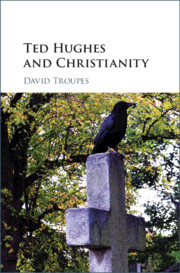Book contents
- Ted Hughes and Christianity
- Ted Hughes and Christianity
- Copyright page
- Dedication
- Epigraph
- Contents
- Acknowledgments
- Abbreviations
- Chapter 1 The Deeper Life
- Chapter 2 The Biological Fall
- Chapter 3 The Biblical Fall
- Chapter 4 The Crucifixion
- Chapter 5 Puritanism and the Goddess
- Chapter 6 Sacrament and Transcendence in River
- Chapter 7 Sylvia Plath: Being Christlike
- Afterword: Glimpses
- Bibliography
- Index
Chapter 4 - The Crucifixion
Published online by Cambridge University Press: 17 June 2019
- Ted Hughes and Christianity
- Ted Hughes and Christianity
- Copyright page
- Dedication
- Epigraph
- Contents
- Acknowledgments
- Abbreviations
- Chapter 1 The Deeper Life
- Chapter 2 The Biological Fall
- Chapter 3 The Biblical Fall
- Chapter 4 The Crucifixion
- Chapter 5 Puritanism and the Goddess
- Chapter 6 Sacrament and Transcendence in River
- Chapter 7 Sylvia Plath: Being Christlike
- Afterword: Glimpses
- Bibliography
- Index
Summary
The central symbolic event of the Christian religion appears everywhere in Hughes’s poetry and prose, explicitly and implicitly, as a fundamental metaphysical statement about the human condition. This chapter begins with a discussion of “Hawk in the Rain,” the opening and title poem of Hughes’s first collection, as an update of Hopkin’s explicitly Christological poem “The Windhover,” which leads to a consideration of how the crucifixion has been made less horrific over the years through the use of comforting cultural “roses.” Making much use of the theologian Paul Tillich, this chapter introduces the concept of teleological freedom, of which the crucifixion is a powerful representation, not least in Hughes’s poetry. Key crufixional Crow poems, especially “Crow Blacker Than Ever,” are discussed, and the prevailing critical reading overturned. The chapter concludes with a theological and literary look at Jesus’ death-cry, an act which echoes repeatedly in Hughes’s work.
- Type
- Chapter
- Information
- Ted Hughes and Christianity , pp. 77 - 120Publisher: Cambridge University PressPrint publication year: 2019

